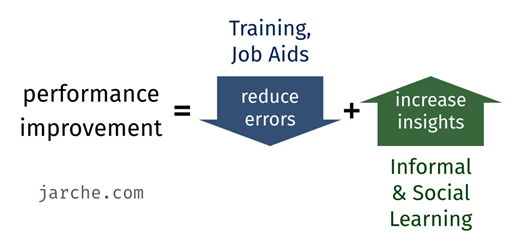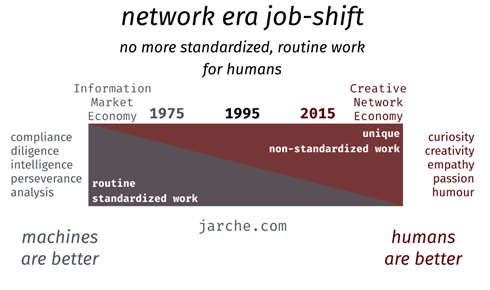
Source: http://luminet.co.uk
Recently, a client and friend of mine who is in the area of Learning & Development share me an article. I believe and agree that the workplace training is evolving, and as such, our methods and intentions of training is also evolving. We are having lesser and lesser standardised work, and as such, trainings should now be people focused – not process focused. And you can’t train that – but you can put in practices to encourage it. These are called insights – informal or social learning that helps one become more creative & innovative.
Here’s the article:
Organizational performance improvement is comprised of reducing errors and increasing insights, according to Gary Klein. For the past century, management practice has focused very much on error reduction, with practices such as Six Sigma, especially in manufacturing.
“Fifty-eight of the top Fortune 200 companies bought into Six Sigma, attesting to the appeal of eliminating errors. The results of this ‘experiment’ were striking: 91 per cent of the Six Sigma companies failed to keep up with the S&P 500 because Six Sigma got in the way of innovation. It interfered with insights.” —Gary Klein
Learning and development (L&D) practices reflect this priority on error reduction. Subject matter experts are interviewed or observed, good practices are noted, and then training programs are designed to develop the skills that make up some or all of a job. Anyone with the requisite abilities, as quantified in the job description, can then be trained.
But what if we don’t know what work needs to be done? This is the area of insight. We cannot know in advance what insights will develop emergent practices. Most organizations have some error reduction processes in place. Few have practices to increase insights. We cannot train for insights. But we can put in practices that might lead to an increase in insights. Klein identified five types of ‘triggers’ that produced insights, based on 120 case studies he reviewed.
- Contradictions
- Creative Desperation
- Connections
- Coincidences
- Curiosity
These five triggers can be enhanced through informal and social learning. The last three are often outcomes of the practice of personal mastery. Insights usually come while working, resting, and playing, not while undergoing training.

As more aspects of jobs get automated there will be less demand for standardized, routine work to be done. This is the type of work for which training has traditionally been developed. But there will be an increased demand for unique, non-standardized work. While courses cannot be developed to directly improve these human traits — curiosity, creativity, empathy, passion, and humour — systems can be put in place to promote them at work. Often this involves reducing artificial barriers between people so they can learn from each other.
To improve insights on an organizational level, all work should be focused on learning. This is learning while working, not heading off on a course or attending a class. Social learning involves working out loud, sharing insights, questioning assumptions, and trying things out together. Time is needed for all of this, especially time for reflection, missing in all too many workplaces. Encouraging and supporting social learning can prepare the workforce for a creative, network economy.

This economy, and the society that emerges, will be much more complex than the previous market economy. We are already seeing signs of this as our established institutions struggle to deal with complex challenges for which they were never designed. Complex problems often require insight, beyond what training can prepare anyone for. There are no clear objectives with complex problems. Learning as we probe the problem, we gain insight and our practices are emergent (emerging from our interaction with the changing environment and the problem). This is social learning, which is much fuzzier than following a prescribed educational curriculum. Prescribing training to address complex performance situations does not work. There are too many variables to train for. Instead, systems and structures are needed to support social and informal learning in work teams, communities of practice, and social networks. This is 90% of the 70:20:10 principle.